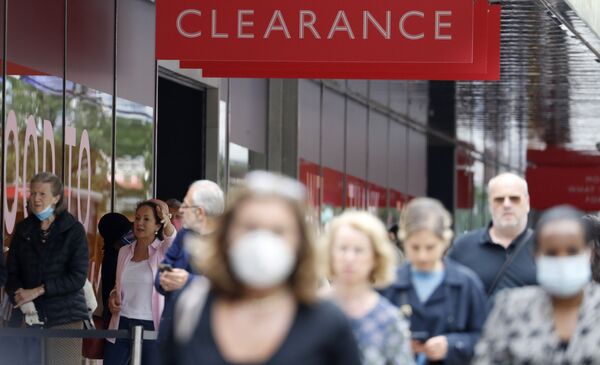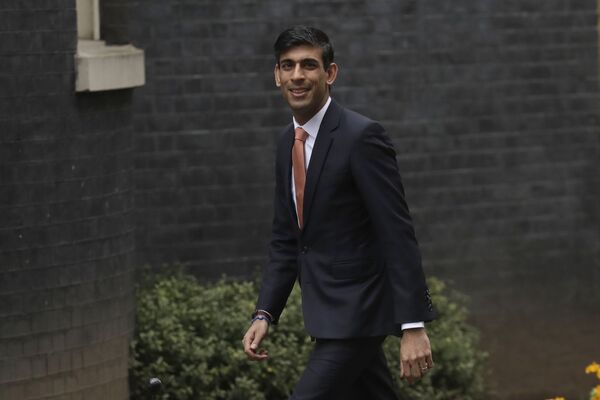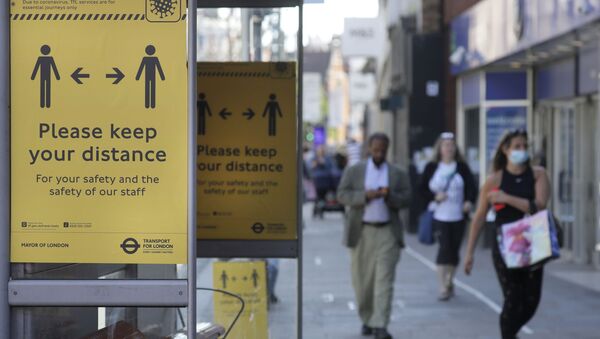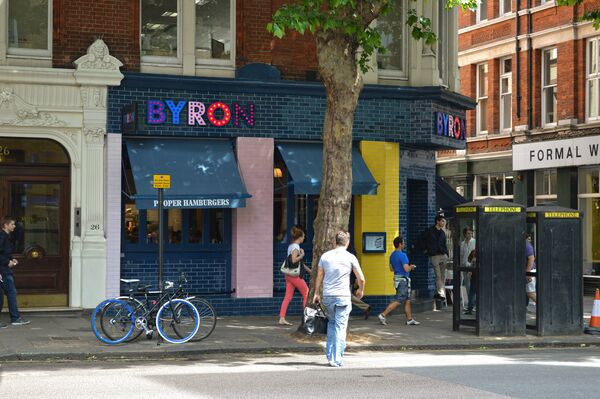The United Kingdom's staple High Street is undergoing its biggest upheaval in over a century, a director for market research organisation Springboard revealed on Thursday.
Diane Wehrle, who is a leading expert in the retail market, explained that the coronavirus pandemic is accelerating an already ongoing process of digitisation.
"This is all about an acceleration of the change in the way we shop, which is becoming increasingly digitised and coronavirus is really just highlighting that", she said.
However, while demand is down as the UK maintains a social distancing regime, Diane explained that the majority of transactions are still in-store while online shopping still accounts for around a quarter of retail, meaning the threat of a complete online take-over is not yet likely.
She explained that despite a lot of the UK's "best names" closing their doors, the majority are still going to stores, and "there are a plethora of stores out there".
Since March, the British High Street has seen some of its staple brands announce their closure including Debenhams and Byron Burger and many others have fallen into administration.
"WHSmiths really good example. When smiths grew their network online didn't exist and supermarkets didn't sell what they sell so it changed the retail landscape", Diane said.
She continued, saying that retail has to be "competitive, you have to be innovative and that's something Smiths hasn't really been managing to do".
"While we aren't going to get monopolisation of online, we are going through the biggest change in retail we've had probably in centuries around who is out there on the High Street", she said.
When asked about the unprecedented speed of job losses, however - WHSmith announcing a 1500 headcount reduction in March Alone - she said that stores will likely shift towards a low-staff business style.
"If you've got fewer customers in locations you don't need as many staff so inevitably they will reduce that first".
"You don't need as many staff to keep the shelves full, you don't need as many staff to man the tills as some of them are customer operated, all of those mean that you can reduce your staff much more easily than you would have done 30 years ago", she added.
Diane predicted that due to the temporary and "fluid" nature of the retail market, businesses cutting their workforce today could be rehiring them in six months.

On tourism, she said that "for a short while, we are going to see more stores vacant than we ever did" but some will do better than others.
"In the short term, we are likely to see a contraction but a lot of these retailers we see out there are fading anyway. If you look around they're not very imaginative or innovative", she said.
She said the retail market will likely concentrate in larger cities as more independent stores stimulate the domestic tourism industry
"You go to areas around the UK as a tourist, you go to different towns and cities and you see independent stores - a baker, or a gift shop and we think they're amazing. That's what gives the excitement to our High Street", she explained.
"So yes there is going to be short-term pain but ultimately what we are looking at is a long-term gain".
She also cautioned that eventually the government's furlough scheme, which has been subsidising employment as businesses close their doors through the pandemic, "is costing nearly as much as the National Health Service and can't go on for much longer".
Government Support Ending Too Soon?
This comes as Springboard research on Tuesday revealed that shopping in the UK rose 6% in the week of 20 August when compared with the preceding week.
The organisation said the three destination types benefited from a rise in consumption, namely shopping centres, which experienced a 9.1% spike, high streets up 4.8%, and retail park footfall increasing 5%.
The jump led to an annual reduction to 26.1% - an improvement on the drop seen year-on-year of 30.7% the week prior.
This follows the end of Chancellor Rishi Sunak's 'Eat Out to Help Out' scheme, which Springboard's director explained has highlighted marketing potential for "getting their prices right".

The scheme, that saw diners receive 50% off, up to £10, ended on Monday. 84,000 outlets signed up, and claims for 64 million meals were made, according to Treasury statistics. However, some business are voluntarily keeping the deal beyond its state-directed headline.
Businesses saw record-breaking commercial activity with OpenTable data showing that eat-in dining increased by 106% last Tuesday compared with the same day the previous year.
The final data is in on "Eat Out to Help Out" - the biggest experiment the world has ever known in boosting footfall to restaurants, cafes, pubs.
— dan barker (@danbarker) September 1, 2020
Here's data on 'Seated Diners' going back to the start of July, from OpenTable.
The final day was up 216% on the same day last year pic.twitter.com/6bjf0ROnNL
The government has also begun to wind down the furlough scheme, which since March has seen those unable to work from home paid 80% of their pay, up to a maximum of £2,500 monthly.
Around 10 million people have had their wages subsidised throughout the crisis in an effort to dissuade businesses from sending people into workplaces.
The decision to end the job retention scheme in October has been criticised amid fears that it could exacerbate the encroaching unemployment crisis. Labour Shadow Chancellor Anneliese Dodds described the move as “very, very short-sighted” and called for a “more flexible system of wage support”.
"The Chancellor said he doesn't want to pick winners, but this government has designated losers"
— PoliticsJOE (@PoliticsJOE_UK) July 7, 2020
Shadow Chancellor Anneliese Dodds calls on Rishi Sunak to reduce avoidable redundancies as the furlough scheme starts to wind down. pic.twitter.com/vcPBVFglvH
Dodds also warned that millions of people being taken off of furlough could exacerbate the contrast between the pandemic response by Westminister and that of the Scottish government, resulting in a further rise of independence sentiment.
The Bank of England, however, has said that workers should be helped to ''move forward'' and not kept in unproductive jobs. Andrew Bailey, who serves as Governor of the national bank said that that coronavirus would inevitably see some jobs became redundant.
Mr Bailey said that new data indicates that the recovery programs have been successful due to increased consumption, as spending on food and energy bills remain above pre-COVID levels.
"We have had a strong recovery in the last few months. The pace puts the economy ahead of where we thought it would be in May", he said.
An Unprecedented Crisis
Between April and June, the United Kingdom plunged into its deepest recession on record as the economy contracted by more than a fifth in the first half of 2020. The economy shrank by 20.4% in the second quarter, leaving the worst hit among the world's major economies, according to the Organisation for Economic Co-operation and Development.
Recovery stalling
— GnS Economics (@GnSEconomics) September 2, 2020
🇺🇸#US 🇯🇵#Japan 🇩🇪#Germany 🇫🇷#France 🇮🇹#Italy 🇪🇸#Spain 🇬🇧#UK 🇨🇦#Canada 🇳🇴#Norway 🇸🇪#Sweden #recession #recoveryhttps://t.co/ippAYBDGvL pic.twitter.com/pjlY2SeWOZ
The UK's specific reliance on the sectors worst affected - shopping, services, and hospitality - has seen the emergence of visible scars across the High Street of the nation's staple businesses closing across the whole country.




